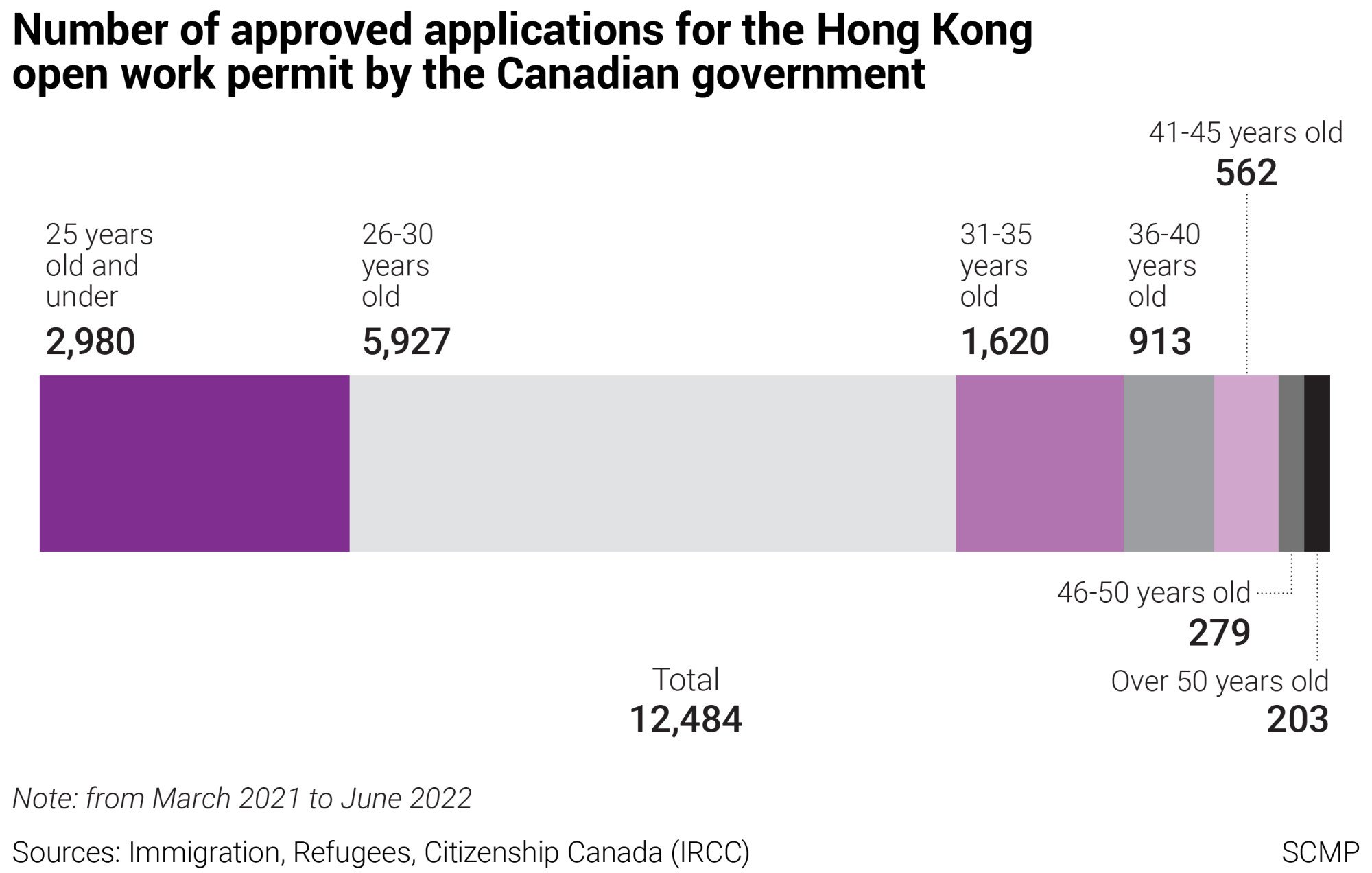
Hong Kong migrant hopefuls: Canada hands out 12,500 open work permits to young, well-educated
- Nine in 10 successful applicants for permits not tied to specific employers were under 40
- Only those with postsecondary qualifications from recent years qualify for open work permits
Canada has issued nearly 12,500 open work permits to Hongkongers since last year, with almost a quarter going to those aged 25 or under, fuelling concerns of a brain drain in the financial hub.
Canada, like Britain and Australia, announced new and easier pathways to immigration for Hongkongers after Beijing imposed a national security law in the city in June 2020, banning acts of secession, subversion, terrorism and collusion with foreign forces.
Replying to questions from the Post, Immigration, Refugees and Citizenship Canada (IRCC) said a total of 12,484 open work permits were issued from March last year to June this year.

Of the total, almost a quarter were aged 25 or under, almost half were 26 to 30 years old, 13 per cent were 31 to 35 and 7 per cent were 36 to 40.
Only about 5 per cent were those aged 41 to 45, while those in the 46 to 50 and over-50 groups each accounted for 2 per cent.

Unlike work visas, the open work permit allows individuals to enter Canada without being tied to a specific employer.
To qualify for permanent residence, those with a three-year open work permit must work full-time for at least a year or chalk up 1,560 hours.
Open work permits are given only to those with recognised postsecondary qualifications obtained within the past five years. An accompanying spouse or partner and dependent children can obtain work or study permits.
Canada is No 2 choice for Hongkongers studying abroad
Among those granted an open work permit was Alton*, 30, a former senior civil servant who left for Toronto in May.
He was involved in policymaking at a Hong Kong government bureau, earned more than HK$1 million (US$127,391) annually and had a promising career ahead of him.
Alton, who is gay, decided to leave in 2020 due to the discrimination the LGBT community faced in the city, and applied for Canada’s “Express Entry”, a fast-track scheme offering permanent residence immediately to successful applicants.
While he waited for a result, Canada announced the open visa scheme and he qualified as he had a master’s degree in social science from the University of Hong Kong.
He applied for the open work permit and was successful. His Express Entry application was granted recently too, and he has obtained permanent residence.
Hong Kong migration to Canada soars to levels unseen since 1998
Alton said his salary in Hong Kong was equivalent to that of a deputy premier in a Canadian province, but the worsening human rights and political situation in the city made him leave.
“I am still young and willing to give up my career in Hong Kong,” he said.
He said he was particularly affected by remarks made last year by pro-Beijing lawmaker Junius Ho Kwan-yiu.
Attacking a plan for Hong Kong to host the international Gay Games, the lawmaker sparked controversy by calling the event “disgraceful” and saying any revenue from it was “dirty money”.
Referring to Ho’s remarks, Alton said: “I know there is no future for me, and Hong Kong’s political future provides no way out either.”
Hong Kong Gay Games ‘a wolf in sheep’s clothing’, lawmakers warn
Alton’s partner, who is also a Hongkonger, applied for a study visa and was successful, so they moved to Canada together.
The former civil servant started a Facebook page, “Hehe immigrating”, to tell his story of emigrating with his partner, and offering tips on how to get a driving licence and rent a home.
So far, he has had no success on the job front. Since moving to Toronto, he has sent out more than 100 applications but has yet to land an offer.
“I’ve been looking for jobs in the government and some NGOs, but finding even a clerical job is not easy, whereas finding blue-collar work is much easier,” he said. “Employers expect applicants to have some Canadian experience.”
Asked if he was worried, Alton said: “Yes and no.” He explained that he had enough savings for now, and might want to study.
Canada’s new immigration path for Hongkongers attracts strong interest
A human resources consultant in Hong Kong said the data on Hongkongers emigrating pointed to a shrinking pool of talented, young manpower in a city with an ageing population and record low birth rate.
Alexa Chow Yee-ping, managing director of recruitment agency ACTS Consulting, said that Canada’s scheme to take in the young and educated posed a threat to the workforce.
Concerned about the exodus of talent, she said even the government was encouraging young people to work in the Greater Bay Area, which connects Hong Kong, Macau and nine Guangdong cities and offering subsidies for those who did so.
“Employers won’t feel it now as most cut costs or stopped hiring during the pandemic, but they will face hiring difficulties when the economy picks up, may be next year,” Chow said.
* Name changed at interviewee’s request.

